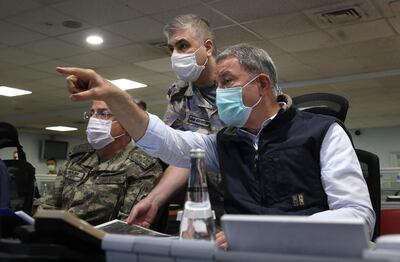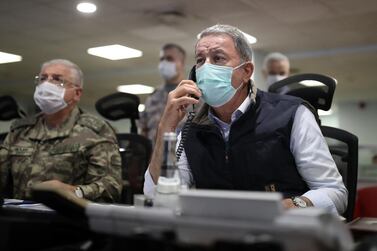In tandem with the Turkish special forces' assault into Iraqi Kurdistan, Iran has carried out heavy shelling of areas of the semi-autonomous province along its borders, local media reported.
A Turkish Defence Ministry statement on Thursday alleged their F-16 jets, drones and howitzers had hit and destroyed more than 500 PKK targets in 36 hours.
It also came as the governor of Silopi district in south-west Turkey claimed that Kurdish militants were behind a roadside bomb that killed four workers.
The blast occurred near the borders with Iraq and Syria, while the vehicle was carrying fuel to be used by workers involved in road construction, the Sirnak governor's office said in a statement.
It said the explosives were planted and detonated by Kurdistan Workers Party (PKK) militants but offered no evidence of the allegation.
Erbil-based Rudaw news and other Iraqi networks reported Iranian shelling in the Alana and Haji Omeran district bordering Iran that coincided with the ground offensive launched on Wednesday by Turkey.
Ankara is battling the Kurdistan Workers’ Party or PKK, a group that has led a decades-long insurgency in Turkey’s mainly Kurdish southeast region. It is considered a terrorist organization by Turkey, the United States and the European Union. The conflict has led to the loss of tens of thousands lives since it started in 1984.
Turkey said the operation, dubbed "Claw-Tiger", came after a "recent upsurge in attacks on our police stations and military bases" near the Iraqi border.
The defence ministry said "commandos" moved in, supported by drones and helicopters, following a bombardment with rocket launchers and artillery guns that hit more than 150 targets.
Joining Iraqi parliamentarians and officials in condemning the incursion, the UAE Ministry of Foreign Affairs and International Co-operation released a statement on Thursday morning warning that Turkish and Iranian attacks in the north violated the sovereignty of the country.
The statement “affirmed the UAE’s consistent and principled rejection of all interference in the affairs of Arab countries, stressing the country's commitment to respecting the sovereignty of the brotherly state of Iraq, adhering to the principles of good neighbourliness, and refraining from posing a threat to security and peace in the region.”

Delsher Abdulsata, the mayor of Batifa village in the Haftanin area of Dohuk province, said Turkish forces entered the villages of Keshani, Shilan, Menira, Belbla, Mezuri, Awlayi and Reesha.
Bombings began Tuesday night and continued throughout the day Wednesday, he said.
Residents of the villages refused to leave their farmlands because it is their only source of livelihood, he said.
Zagros Hiwa, a spokesperson for the military wing of the PKK, said fighting was continuing in the Haftanin area along a 200-kilometre front line.
“These operations are part of Turkey’s plan to expand in the area as they did in Libya and Syria,” he said.
Turkey began expanding its military footprint in Iraq last summer in an intense operation against PKK targets following the July 17 assassination of consulate worker Osman Kose in the northern Iraqi Kurdish city of Irbil. Ankara has blamed the PKK for his killing.
Turkish officials have said the operations have focused on cutting supply lines and transport routes connecting the PKK in Turkey and Iraq.
The presence of PKK rebels has brought discomfort to senior Iraqi Kurdish officials, with one official saying the areas where PKK function are a “no man’s land.” He spoke on condition of anonymity to discuss the operations.
Kawa Sheikhmous, a PKK official who was in Iraq’s northern Kurdish region Tuesday, criticized the Iraqi government for not taking a stronger stance against Turkish incursions.
“We condemn this act and consider it against the interests of the people,” he said. “Our message to the Iraqi government is that it should not tolerate this interference in the sovereignty of Iraq.”
Separately, rockets hit Baghdad's Green Zone, home to the US embassy, on Thursday, the fifth such attack in 10 days, security sources inside the high-security district told AFP.
There were at least three explosions, followed by the sound of sirens in the Green Zone.
There were no immediate reports of casualties or damage.
Like previous attacks, there was no claim of responsibility.
Since October, at least 32 attacks have targeted American interests in Iraq that the US has blamed on Iran-backed factions among Iraq's security forces.
It was the second rocket attack near the US embassy since June 8 while other attacks have targeted Baghdad airport, where US troops are stationed, and a base north of the capital.
Tensions between Washington and Tehran reached boiling point in January when the US killed Iranian general Qassem Suleimani and Iraqi commander Abu Mahdi Al Muhandis in a drone strike in Baghdad.
Since then, Iraq has a new, US-friendly prime minister and there had been a lull in rocket attacks in recent months.
The resumption of attacks after weeks of calm coincides with the launch on June 11 of a strategic dialogue between Washington and Baghdad that aims to better define their military, economic and cultural relationship, although experts do not expect great results.
As part of the talks, Washington has already pledged to continue reducing in-country troop levels, which numbered about 5,200 last year.
In response to the US drone attack, Baghdad's parliament voted to expel all foreign soldiers from Iraqi territory, but the decision was never implemented.






